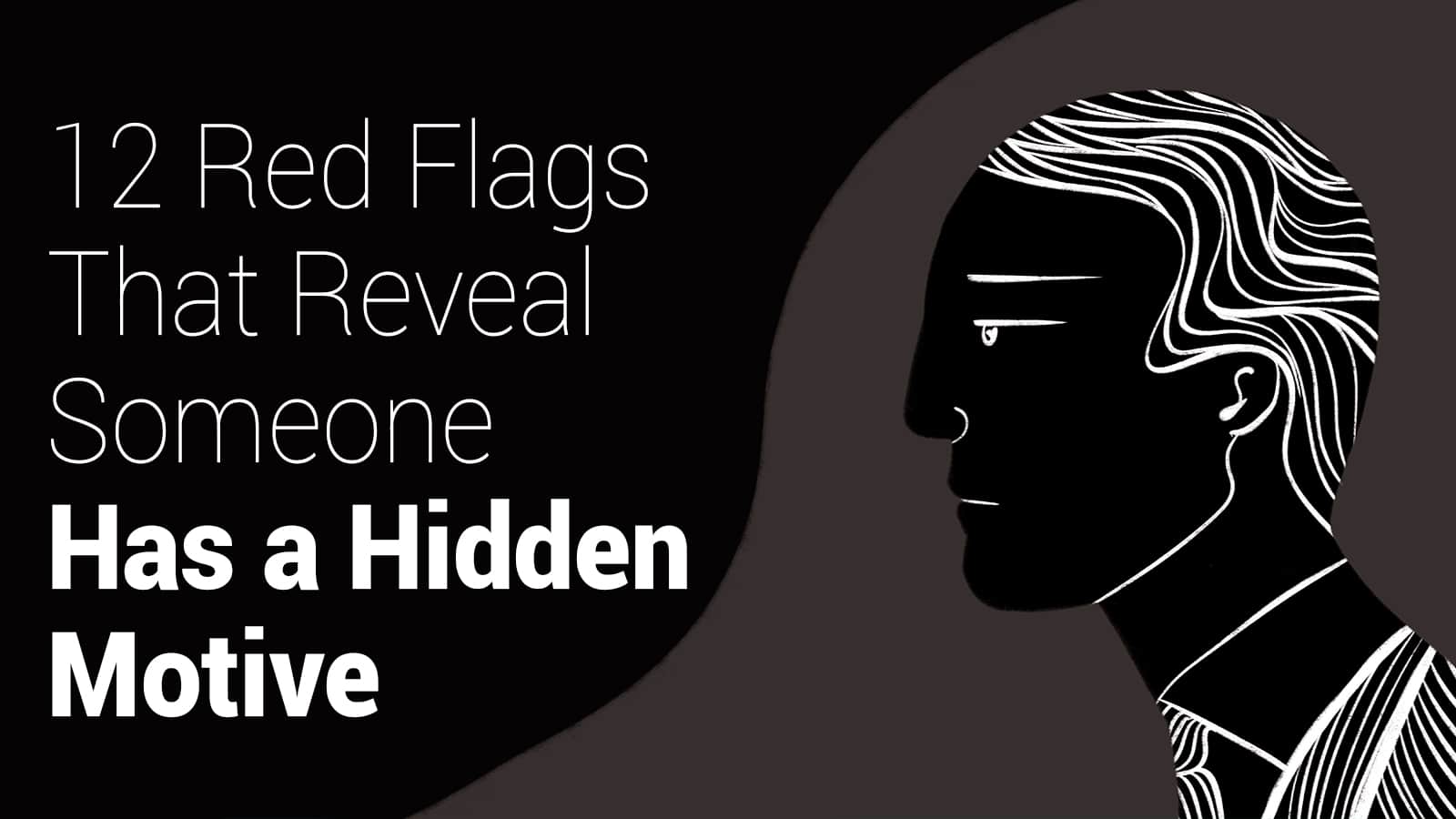Most people do favors and offer gifts from the kindness of their hearts. Their intentions are pure, and there aren’t any strings attached. However, some people are users and have a hidden motive for anything they do or give to you.
You’d like to think that everyone in your circle is genuine. However, there’s always at least one fake person in the bunch who’s nothing but self-serving. They specialize in using people and disposing of them when they’ve nothing else to give.
Twelve Signs That Reveal Someone With a Hidden Motive
On the surface, manipulative people appear to be charming and the perfect best friend. Soon, these slithering snakes, also known as toxic individuals, reveal their authentic selves when they ease into patterns of using others. Once they get a foot in your door, it’s challenging to get them out of your life. Here are some easy ways to know if a person has a hidden motive.
1. A Person With a Hidden Motive Is Only Nice When They Want Something
You’ll have some friends and family members who are always there when they need you. Yet, their hidden motive is often so subtle that you don’t realize this person duped you. For these toxic users, you’re only a means to get them what they want.
You can always tell when they’re on the prowl with their secret agenda. Their regular pattern is to appear at your door after an extended period of absence. They slither back into your space with one goal in mind.
They’ll be your best friend until you give in and help them. The moment you hand them the check or do a favor, they slip into the shadows and disappear. Unfortunately, they’ll be back with sugary words and their hand out.
2. It’s Different for Someone With a Hidden Motive if You Need a Favor
One of the beautiful things about friendship is that friends reciprocate kindness. A loyal friend strives to give as much as they receive. If you have a friend who is using people, their generosity always has an ulterior motive.
Toxic people often conveniently forget all the things you’ve done for them. But they are constantly reminding you of any favor they’ve done for you. Anything they do for you has strings attached, and they want the world to know.
3. They’re All About Themselves
There’s nothing wrong with loving yourself as a person and having self-confidence. When self-love is taken too far, a person may develop a narcissistic personality. Narcissists are some of the most toxic friends you’ll ever encounter.
Listen to your conversations with them and notice how they’re directed. Self-absorbed people can’t get beyond sentences with “I, me, my, and mine.” As you patiently listen to their current drama, it will be a one-sided monologue.
Should you get a word in edgewise, this egotist may say, “Oh really? How nice. But back to what I was saying about me.” They’re not the least bit interested in your input. Their hidden motive is to use you as a sounding board for their drama.
4. A “Moocher” Might Have a Hidden Motive
It’s common for friends to treat one another to dinner or an outing occasionally. Real friends keep the scales of reciprocity balanced and won’t take advantage. Still, there’s always that cheapskate pal who likes to party on your dime.
Some red flags to consider are the friend who conveniently forgets their wallet every time you go out together. They may offer to pay you back, but usually, these toxic people have amnesia when it suits them.
Why should they pay for anything if you’re so willing to flip the bill? It may be a hidden agenda, or it could be a flaw in their personality. According to an article published by Moneyning, extreme frugality can signify a mental illness.
Regardless of what motivates your mooching friend, it’s not fair to you. Some of these people go beyond money and are chronic borrowers. They use you like a virtual warehouse for their needs, and they often forget to return things.
5. They Use Guilt to Manipulate You
Chronic users are travel agents for guilt trips. Your toxic friend probably knows you well enough to know your weaknesses. They will push those buttons and manipulate you to get what they want.
When you say no, they’ll try their best to make you feel sorry for them. Some of their tactics may include tears and exaggerated emotions. If you’ve given in to their hidden motive before, they assume you’ll do it again.
6. You’re Their Last Resort
The chances are that you and your selfish friend have mutual buddies. For them to succeed with their exploitative ways, they need a collection of soft-hearted folks. If one person says forget it, they’ll move on to the next person in line.
You might be on the bottom of their list, which isn’t always a terrible thing. They may call you after weeks of no contact because they’re bored. This hoodwinker expects you’ll entertain them and possibly help them out of a crisis.
7. They Don’t Keep Their Word
Some of the lines that freeloading friends use are classic. “I’ll pay you back Friday,” or “Next time, it’s my turn to treat.” Of course, Friday never comes, nor does your turn to be treated.
They figure that you’re an easy target and don’t mind being their ATM. These unreasonable requests go beyond mooching money. A toxic user will call you constantly for babysitting, rides, or to borrow something. They swear to return the money and the favors, but their promises bounce like their checks.
8. They Aren’t Grateful
Your parents taught you at an early age to show gratitude to others. You sincerely thank them when someone is kind enough to buy you a gift or do a favor. Another negative quality of a sponging friend is that they take your graciousness for granted.
They’re often like a spoiled child and overwhelm you with their wants. Rarely will you receive a genuine thank-you or any other gratitude? You can forget about them doing anything for you without them acting like you’re a bother.
9. They Get Defensive When Confronted
It stands to reason that people with a hidden motive are aware of their manipulative ways. There may have been times when you’ve had it with their freeloading and confronted the issue. At first, they may act shocked or indignant with your honest conversation.
Then, they’ll often go on the defense and try to shift the blame to you. An article published by Psychology Today explains that blame-shifting is abuse. It’s a tool that toxic people use to manipulate and control others.
The drama continues as they try to turn the tables and accuse you of being selfish and a rotten friend. All the negative qualities they want to pin on you’re the ones they struggle with in life. Unless you stand your ground, they’ll be back the next time they need you.
10. People With Hidden Motives Don’t Respect Boundaries
Regardless of whether a relationship is personal or professional, it must have set boundaries to last successfully. Those with a hidden motive will cross any line for their selfish interests. Each time they disrespect you, they erase more of your personal boundaries.
It’s often so subtle that you don’t realize you’re losing ground. The more you concede in more minor matters, the more they will challenge your will. Soon, they’ll have you on speed dial and won’t think about inconveniencing you.
11. They Create Negativity and Chaos
You and your genuine friends have each other’s best interests at heart. Being together cultivates positivity, inspiration, and joy. The scales of give and take are balanced, and you make each other better people.
Such isn’t the case with those with a hidden motive. The minute their number displays on your caller ID, you instantly feel anxiety and dread. If this pattern continues, it will shroud your mind with resentment, uneasiness, and hopelessness.
Manipulative people are virtual vampires who drain your time, energy, and resources. They lurk in the shadows with their hidden agendas and can’t tolerate the light of confrontation. These folks rob you of dignity and joy.
12. They’re Deceptive
You know the questionable buddy who is always down on their luck and wants you to be their savior? Much of their misfortune may be a result of poor decisions and negative behaviors. They often must create a façade and a believable sob story to draw you into their drama.
Many toxic people are pathological liars to the point that they deceive themselves. No matter how many lies you catch them in, they have a well-rehearsed rebuttal. If they’re dishonest with everyone else, why would they be truthful with you?
Final Thoughts on Fake Friends with a Hidden Motive
A friend’s motives are soon evident without them saying a word. You’ll notice the positive characteristics and actions of devoted friends. Close your heart’s door and your wallet to freeloaders and learn to say “no.”

















 Community
Community

